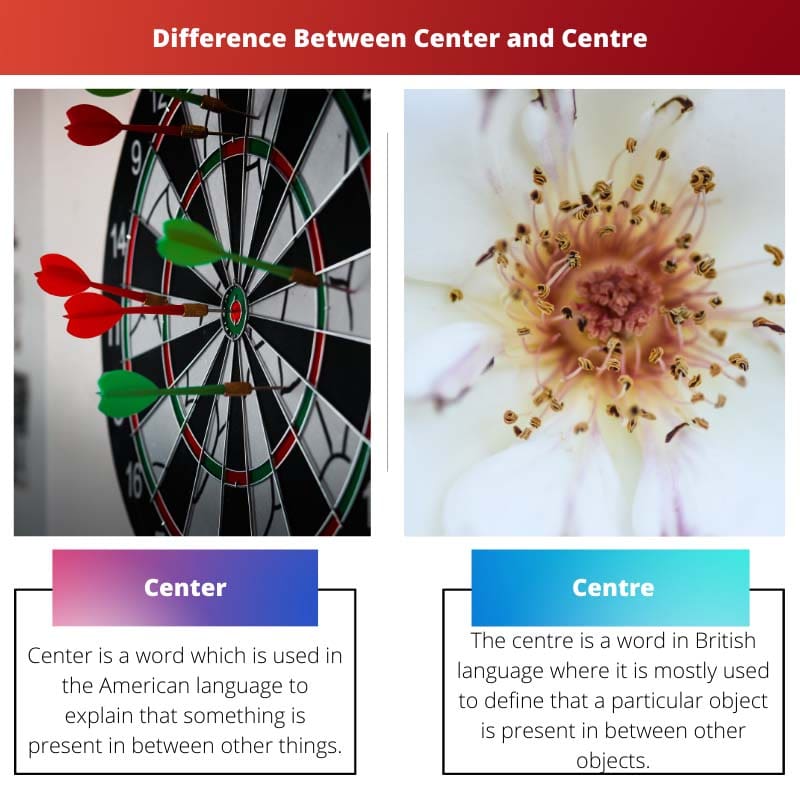“Center” and “centre” are alternative spellings of the same word, representing the midpoint or focal point of something. “Center” is primarily used in American English, while “centre” is more common in British, Canadian, and Australian English.
Key Takeaways
- Center and centre are both spellings of the same word, but center is used in American English while centre is used in British English.
- The difference in spelling is due to the historical development of the English language in different regions.
- The spelling choice depends on the variety of English used and personal preference.
Center vs Centre
The difference between center and centre is that the center is a word which is used in the British language, whereas centre is a word which is used in the American language.

Since all of you learned the difference between center and centre, now it is time for you to understand the points of difference and the comparison of both terms.
Comparison Table
| Feature | Center (American English) | Centre (British English) |
|---|---|---|
| Meaning | The middle point of something; a focal point | The middle point of something; a focal point |
| Part of speech | Noun, adjective, verb | Noun, adjective, verb |
| Usage | Preferred spelling in the United States and some other countries influenced by American English | Preferred spelling in the United Kingdom, Canada, Australia, and other countries influenced by British English |
| Pronunciation | /ˈsɛntər/ | /ˈsɛntə/ |
| Examples | The center of the city | The centre of the city |
What is Center?
The term “center” refers to a point, place, or position that is the middle or focal point of something. It can denote various concepts across different contexts, including spatial, geometric, organizational, or conceptual centrality.
Spatial and Geometric Meaning
In spatial or geometric contexts, the center represents the midpoint or central location of a space, object, or structure. For instance, the center of a circle is the point equidistant from all points on its circumference, while the center of a square or rectangle is the point where the diagonals intersect.
Organizational and Conceptual Significance
In organizational settings, the center signifies the core or main hub of activity, such as the administrative center of a company or the central office of a government agency. It can also symbolize the focus or primary area of interest within a particular field, discipline, or discussion.
Cultural and Symbolic Connotations
Beyond its literal meaning, “center” can carry symbolic connotations, representing unity, balance, stability, or importance. In cultural contexts, phrases like “the center of attention” or “at the center of controversy” illustrate how the term is used metaphorically to describe a person, idea, or event occupying a central role or receiving significant attention.

What is Centre?
“Centre” is a variant spelling of the word “center,” primarily used in British, Canadian, Australian, and other Commonwealth English dialects. Despite the difference in spelling, “centre” shares the same fundamental meaning as “center,” denoting a point, place, or position that serves as the midpoint or focal point of something.
Usage in British and Commonwealth English
In British and Commonwealth English, “centre” is the preferred spelling in most contexts, including formal writing, publications, and official documents. It is commonly used in various domains, such as geography, mathematics, science, and everyday language.
Regional Preferences and Variations
While “centre” is the standard spelling in British English, it is also widely accepted and utilized in other English-speaking regions influenced by British colonial history, including Canada, Australia, New Zealand, and parts of Asia and Africa. In these regions, “centre” is ingrained in linguistic conventions and regarded as the correct spelling in accordance with local norms.
Differences in American English
In contrast, American English predominantly uses the spelling “center.” This variation reflects historical linguistic divergences between British and American English, stemming from the influence of different language authorities, such as the Oxford English Dictionary in Britain and Webster’s Dictionary in the United States.
Cultural and Linguistic Significance
Beyond its spelling differences, “centre” holds cultural and linguistic significance within British and Commonwealth English. It embodies a distinctive linguistic identity and serves as a marker of regional variation within the broader spectrum of English language usage.

Main Differences Between Center and Centre
- Spelling:
- “Center” is the preferred spelling in American English.
- “Centre” is the preferred spelling in British, Canadian, Australian, and other Commonwealth English dialects.
- Regional Usage:
- “Center” is predominantly used in the United States.
- “Centre” is widely used in British, Canadian, Australian, and other Commonwealth English-speaking countries.
- Linguistic Influence:
- “Center” reflects the influence of American English linguistic norms and dictionaries.
- “Centre” reflects the influence of British English linguistic norms and dictionaries.
- Cultural Significance:
- “Center” is indicative of American English linguistic identity and conventions.
- “Centre” is indicative of British English and Commonwealth English linguistic identity and conventions.

This article was well-structured and provided a clear explanation. Learning new things in language is always a pleasure.
Absolutely, it’s a refreshing change from the usual articles we come across.
This article effectively highlights the differences between ‘center’ and ‘centre’ based on geographical usage.
I’ve always enjoyed learning about language and this article was great!
I appreciate the detailed comparisons made between the two spellings, very insightful.
An excellent read on the differences between ‘center’ and ‘centre,’ helpful usage examples too.
Definitely! It was enlightening to see how the term is employed in various contexts.
Not a fan of how the article emphasized ‘centre’ as an alternative to ‘center,’ I think the former should be used more widely.
I see your point, but it’s important to recognize both variations in language.
I appreciated the incorporation of formal vs. informal usage, it really provided insightful cultural differences.
That’s true, understanding formality is essential when it comes to language.
Indeed, the article offered a deep dive into language nuances.
The author did a fantastic job illustrating the multi-faceted meanings of ‘center’ and ‘centre.’
For sure, an engaging piece that enhances our understanding of language differences.
I found this to be quite thought-provoking despite the seemingly simple topic of spellings.
Agreed, it’s a testament to the complexity of language structure.
The article managed to balance both intellectual depth and accessible language, a rare combination in articles these days.
I concur, it’s refreshing to find an article both informative and engaging.
It’s a testament to the writer’s skill in presenting complex information in a reader-friendly manner.
The comparison table provided a comprehensive overview, making it easier to grasp the differences between the two spellings.
Absolutely, it’s a clear guide for understanding ‘center’ and ‘centre.’
Very informative article, it’s interesting to learn about the different spellings used in English!
I agree! It’s fascinating how language can change depending on the region.